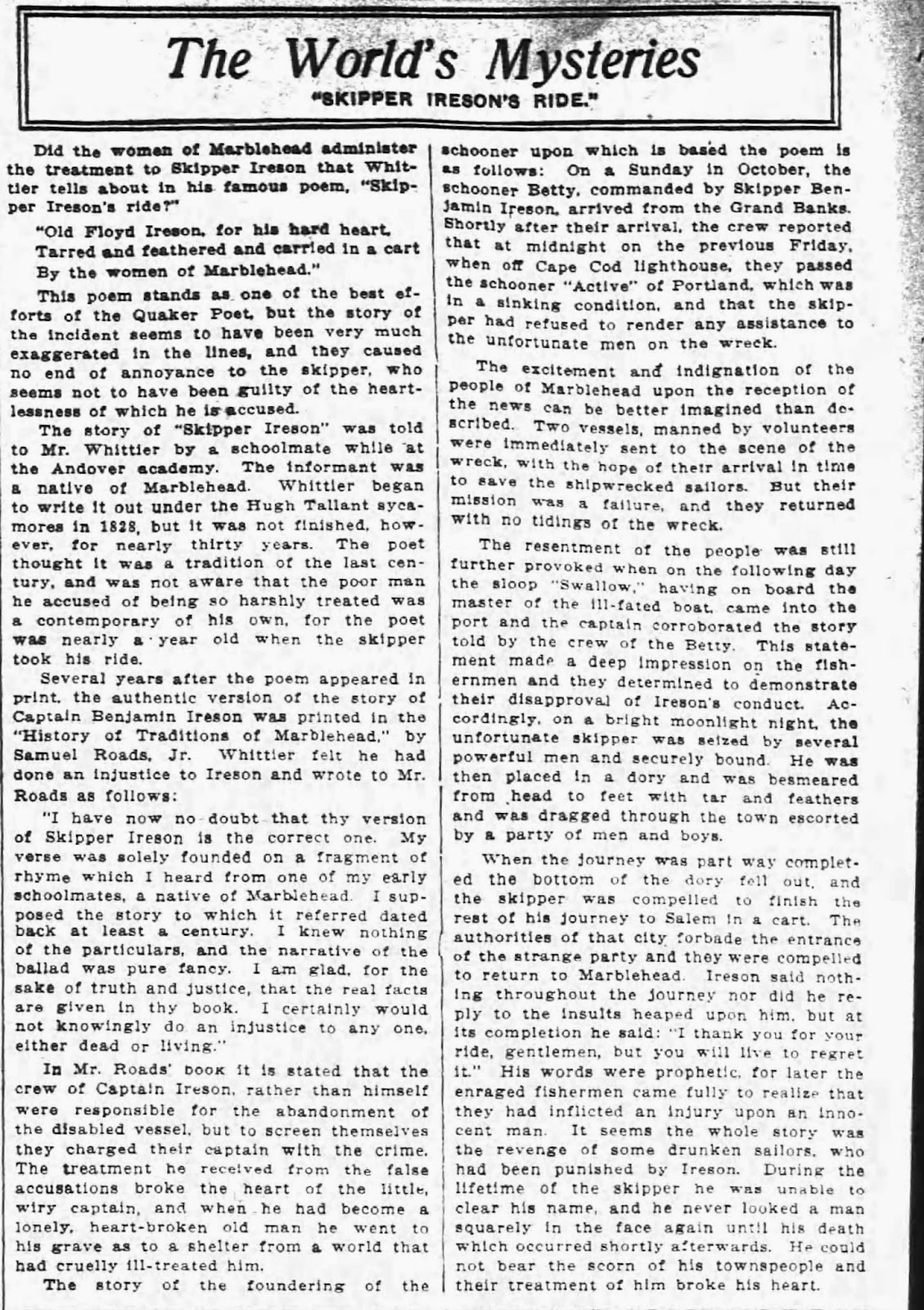Benjamin "Flood" Ireson was a 19th-century American sailor, captain of the schooner Betsy Hoooper. In 1808, during a gale, the Betsy Hooper was on its way from Grand Banks to home port when it discovered another ship, the Active. The Active was wrecked and taking on water. "Ireson tried to rescue the crew of the sinking vessel, but his own men insisted upon giving up an attempt which held considerable dangers. On return to Marblehead, the crew, finding themselves blamed for the loss of life, placed responsibility upon their captain." The people of Marblehead, the Betsy's home port, were outraged with Ireson, and he was tarred and feathered and dragged out of town in a cart.
According to Life and Letters of John T. Pickard John Greenleaf Whittier heard the tales of Skipper Ireson from a schoolmate who lived in Marblehead. Whittier crafted this version in 1828 when he started the work and it took thirty years before it was published.
There was one line in the ballad that struck a chord with many readers: "one-eyed Calendar's horse of brass." Whittier received queries from numerous sources, one from a women in Washington, Gail Hamilton who wrote to him on April 4, 1882 inquiring on this specific line. Copy of Letter from Gail Hamilton to J G Whittier from Life and Letters of John Greenleaf Whittier:
The letter was quite witty, but the author is Mary Abigail Dodge who wrote under the name Gail Hamilton. Dodge, daughter of James Brown Dodge and Hannah Stanwood was from Hamilton, Massachusetts. She lived in Washington in the home of her cousin, Harriet Stanwood Blaine, wife of Speaker of the House James G. Blaine. Dodge was Whittier correspondence: letters sent series (1833-1882) includes this letter and housed at the Peabody Essex Museum library.
The Ireson House at 19 Circle Street in Marblehead would remain a notable Marblehead landmark and be the subject of postcards well into the twentieth century.
Here are some accounts of the story on Skipper Iverson published: From The Rudder Volume 19 The tar-and-feather treatment was popular in all the Massachusetts settlements. In several cases it was applied to men who informed the authorities of the activities of smugglers. In such cases the act met with general approval, since smuggling was no sin in the colonies. One of the last cases of tarring and feathering in Marblehead was that of Skipper Benjamin Ireson, of the schooner Betty, made memorable by J G Whittier's ballad of "Skipper Ireson's Ride." Ireson was accused by his crew of abandoning to their fate the crew of the sinking schooner Active of Portland, which he passed off Cape Ann on the night of October 30, 1807. The Active's captain, who had been taken off by another vessel, confirmed the story of his abandonment by the Betty. Thereupon Skipper Ireson's fellow-townsmen tarred and feathered him, and putting him in a dory started to drag him to Salem. The bottom of the dory was worn through by the rocky road, and Ireson was transferred to a cart. A crowd of men and boys, with music, took him to Salem and back. Ireson kept silence until released, when he said, "Gentlemen, you will regret this." Many of them did, for time showed him to have been wronged. His crew had refused duty when he wished to stand by the Active. They were homeward bound from a long Grand Bank trip, and in their hurry were content to let the schooner look out for herself. This story became known too late to benefit Ireson. lie lived many years in Marblehead, but never was he known to smile after his terrible ride. The children recited doggerel verses commemorating his disgrace. Whittier as a youth heard a schoolmate repeat them, and they formed the basis of his ballad, published thirty years later, in which "the women of Marblehead" are represented as the chastisers of Skipper Ireson. In the revised editions of his works the poet acknowledged the incorrectness of the statements in his ballad, and the unintentional wrong done the memory of Ireson and the women of Marblehead. Ireson's house still stands. It is on Circle Street, near Oakum Bay. The name of Ireson is no countersign to the good graces of a native of Marblehead. One stops almost furtively to steal a glance at the plain wood structure in which the unhappy skipper lived and died. A dour countenance peers from a window. Persons passing look at the stranger with never a word or a smile. Marblehead surely is sensitive still over the wrongs of the past.
Albany Art and History
NEVER Trust a Marblehead Woman: Skipper Ireson’s Wild Ride.
Marblehead Museum
Historic Houses
Library of Congress Digital Photo
A Note on Skipper Ireson's Ride Jules Zanger The New England Quarterly Vol. 29, No. 2 (June 1956)
First Harbor Company
A Poets Town The Chautauquan Volume 13 Margaret B Wright
Floyd Ireson By Henry Colford Gauss
John Greenleaf Whittier Papers, 1781-1922 Peabody Essex Museum Library
Mary Abigail Dodge Papers, 1834-1896 Peabody Essex Museum














.jpg)









No comments:
Post a Comment